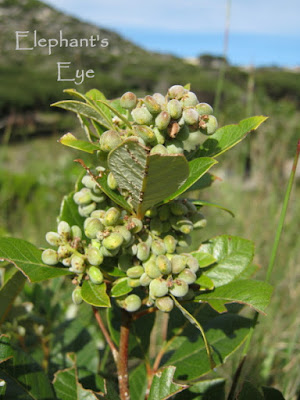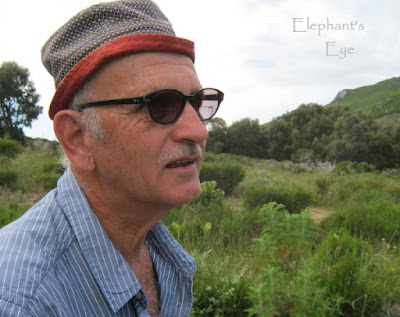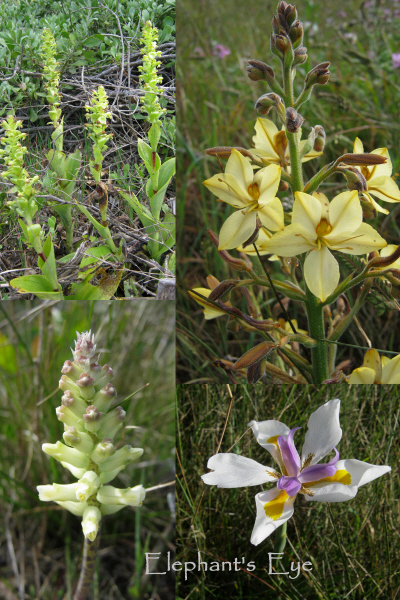Glencairn labyrinth before the fire
by Diana
Studer
- gardening for biodiversity
in Cape Town, South Africa
Update 2021 - RIP Koos Burger creator of the Glencairn Labyrinth. Died of COVID on 24th June
In September last year, a kind time of year, full of green
and flowers, we walked the Glencairn labyrinth
on its second birthday.
That huge rock slab broke into three when it was moved on Mandela Day. For me the heartbeat of the
labyrinth - three in one, together we stand, the differently shaped pieces of
Tutu's 'rainbow people of God' snugly joined. Stepping stone paths and a
slatted wooden bridge crosses the soggy bit.
I have planted Searsia
in each of our three gardens, but never before seen a crop of berries like this
waiting for the birds.
Koos Burger keeps a detailed record both of what he has
planted, and what flowers month by month. When we walked in September we saw
pink Erica, a buchu?, two delicate
pelargoniums, soft yellow bursts of Struthiola,
mustard yellow puffs of ??
Small lives find a place to call home here. Milkweed locust.
Eucalyptus and pine trees inherited from a different time,
before we had learnt the value of our indigenous fynbos. Those
trees blaze like torches when the mountain catches fire!
Koos Burger designed, built and nurtures the labyrinth.
A mathematical mind which spans a labyrinth, and an optical
illusion tumbling block gate (intended to distract from ... the bottom edge
slants)
If you live in California, around the Mediterranean or
Australia you know how you live on edge in fire season. That haze over the sunshine, the light is wrong. I smell smoke. Cape
Town is staggering from fire to fire.
First it was Somerset West (Bezweni lodge), then Grabouw. Ours started in Ocean
View, along the valley behind our mountain and across to Simon's Town (which
burnt in November 2015!) - along the way it sadly reduced the labyrinth to ash.
So grateful to our firefighters who managed to protect all but one house in
Simon's Town. Riversdale. I heard sirens and we had furious wind and a fire
raging at Noordhoek. Another at Lakeside. And the next fire in Tulbagh in the
Groot Winterhoek Mountains (fire
flowers at my first Elephant's Eye). Deer Park on the city slopes of Table
Mountain. Yesterday at Paarl (wine farm gutted) a fire raged out of control.
Given time, some gentle rain, these bulbs and orchids will
return - greenish Satyrium, glowing
yellow Wachendorfia, pastel Lachenalia, white yellow and purple Dietes. Seeds will germinate. Fire-adapted
shrubs and trees will sprout from their roots. Plants will appear that haven't
been seen for decades - as they have where the fynbos
is returning as the burnt pine plantation at Tokai is cleared.
From Koos Burger - The main idea is to collect plants, look after them and start to plant late in April after the first rains.
From Thursday's Echo (our local newspaper)- 'Most of what can regenerate, will grow from seeds. Those seeds are under the ash. When the first rains come in April, they should settle and grow. People are walking on the field - right over the burned labyrinth, with their dogs. This will dislodge any surviving seeds, and add to soil erosion: and then we will have lost everything' - Koos is going to put up signs to discourage the walkers and their dogs. (If that fails, he will have to put up a fence)
Each time we drive across Ou Kaapse Weg we enjoy fresh
flowers as the fynbos
re-establishes itself after the March 2015 fire. Ujubee says fire asparagus blooms two weeks! after fire
to feed the bees.
My first
labyrinth walk was in March 2016 and I wait for the bleak moonscape, with
its 28 turns, to return to green with the autumn rain! Only DAYS
after the Helderberg fire there are fire lilies.
I invite you to join us at Elephant's Eye on False Bay.
Please subscribe as you prefer
via Feedly,
or Bloglovin,
Pictures by Diana Studer
(If you mouse over teal blue text, it turns seaweed red.
Those are my links.
To read or leave comments, either click the word Comments
below,
or click this post's title. If you are in email or a Reader,
first click thru to the blog)










It's painful to see what's been lost to fire. Yes, the land recovers in time but the memories can be seared into our souls.
ReplyDeleteand those poor firefighters. They never get a break!
DeleteThere is a fire burning not too far away from us (here in Canberra) as I write, I understand completely about the summer fear of fires, the smell and the smoky sky. And it truly is miraculous to see plants and flowers coming back so quickly after a fire...I guess that is the joy of observing the land we live in through all the seasons and climate upheavals.
ReplyDeletePS.... And yes the fire fighters they are the heroes! When I rule the world firefighters will earn what politicians earn now!!
ReplyDeleteSome of our firefighters are volunteers, with a 9 to 5 job as well. Good people putting something back into society.
DeleteWhat a fabulous place, though I admit, I thought you had been to Scotland when I read Glencairn! It seems like a wonderful place to visit at many different times of the year. And what a pretty locust (from afar!)
ReplyDeleteA fascinating post, including the link to the article on bees and plant regrowth after the fire! I confess to being very relieved to find myself here where the desert growth is scant enough to reduce the fire hazard, though in the Arizona mountains there have been recent tragic fires. At any rate, even here I have been too nervous to risk planting any Eucalyptus! There would be nothing else for lightning to strike except a few Saguaro cacti... for many miles.
ReplyDeleteFynbos is adapted to fires caused by lightning strikes. Sadly most fires are caused by negligence (discarded cigarette end?), or deliberate arson.
DeleteWhen you share the names of your places and your plants, it's like a beautiful song or a poem. There's such a lyrical lilt to your prose. The labyrinth is wonderful! A friend invited me to walk a labyrinth later this season. I hope the weather will cooperate. Enjoy the wildflowers after the fire.
ReplyDeleteYes, I know what you mean about the smell or sight of fire, Diana. That may be a positive from the intensive farming around us now; with the amount of water they use there is nothing that will catch fire quickly!! It is a small consolation.
ReplyDeleteThat locust looks like something that gave me night terrors as a child. I can take any critter in the garden, but these things! I also have an irrational fear of the big black ones with yellow stripes.
ReplyDeleteAs I child I would cross the road to avoid the large flying hopping brown ones.
DeleteThis red one however plods along more like a tortoise - not so SHRIEK alarming!
Hopefully, people will begin to heed the fire warnings put out by our park rangers, as most of our fires seem to be caused by human carelessness. Wonderful, though, how nature heals. P. x
ReplyDeleteIt is amazing how land adapts to fires, scary as they are. There are certain forests here that have actually had problems because there have been no fires, with humans to put them out, when that is what they have evolved to respond to. Then, on the other hand, wildfires that have caused large amounts of destruction to towns with droughts we have had. Stay safe!
ReplyDeleteI haven't been paying attention and didn't realize you were having a serious fire season there. It is wonderful to know that the labarynth's native fynbos plants will regenerate from the ashes -- assuming that those oblivious dog walkers can be educated or kept out. -Jean
ReplyDelete